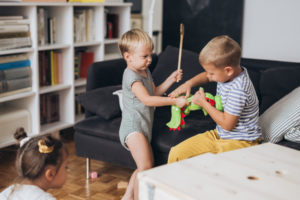Challenging Behaviours: Hitting
My child is hitting other children. What can I do?

Young children sometimes hit because they’re trying to cope with something. They might feel overwhelmed or not know how to express their needs. Understanding why your child is hitting can help you figure out what to do.
Common reasons children hit:
- They don’t have the words to say how they feel—like when they’re angry, excited, or frustrated.
- They feel overwhelmed by noise, lights, or too much going on.
- They’re curious and want to see what happens.
- They’re very tired.
Try to notice what’s happening when your child hits. Ask yourself:
- What time of day was it?
- Who was there?
- What was your child doing?
- What were others doing?
- Was your child tired?
- Who was watching your child?
This can help you find patterns and prevent it from happening again.
Check out the book “Hands are Not for Hitting” by Martine Agassi,
available at NL Public Libraries!
Why is it happening? (click to expand) »When your child hits, they’re trying to communicate. Your child’s brain is not developed enough to use words or understand social rules like sharing or waiting. Learning about child development and your child’s personality can help you respond better. Some kids are more sensitive or react more strongly to things around them. That’s part of their temperament. |
What can I do about it? (click to expand) »You might feel like yelling or using physical punishment—but that teaches kids that hitting is okay. Studies show that physical punishment can lead to more violence later in life. Instead, try these steps:
You can also:
|
What if it doesn’t work? (click to expand) »Your child needs time to learn new behaviours. Talk with them about their day and help them understand what happened. Stay positive and supportive. Give structure before problems happen, and support after they do. If what you’re trying isn’t working, take a step back, think it through, and try a new approach. Taking with your public health nurse, other parents or other community supports may help. |
Services related to this information:
- Contact your Public Health Nurse or health-care provider to discuss your child’s behaviour.
- Contact your local Family Resource Centre for parenting programs and support.
- Visit your local library to check out some helpful books.
- 811 HealthLine (Newfoundland & Labrador) – Call 811 or 1-888-709-2929 / TTY 1-888-709-3555


